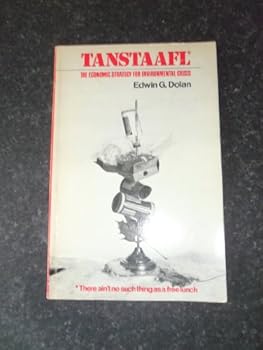TANSTAAFL, the economic strategy for environmental crisis
Select Format
Select Condition 
Book Overview
No Synopsis Available.
Format:Paperback
Language:English
ISBN:0030863155
ISBN13:9780030863158
Release Date:January 1971
Publisher:Holt, Rinehart and Winston
Length:128 Pages
Weight:0.40 lbs.
Dimensions:8.7" x 11.4"
Customer Reviews
1 rating
Revisiting the path not taken
Published by Thriftbooks.com User , 17 years ago
TANSTAAFL derives it's unusual title from a science fiction novel by Robert Heinlein. Heinlein imagined a lunar colony facing ecological catastrophe and outlined an old fashioned revolutionary war for independence, once that owed more to Thomas Jefferson than Che Guevara, as the solution. But how did this get to economics? "The fundamental principle on which this strategy is built may be expressed in a simple slogan--There Ain't No Such Thing As A Free Lunch, the "TANSTAAFL principle," for short. The TANSTAAFL principle is closely related to the fundamental theorem of ecological economics, that everything depends on everything else. Everything worthwhile has a cost. Whenever you think you are getting something for nothing, look again--someone, somewhere, somehow is paying for it. Behind every free lunch there is a hidden cost to be accounted for." "The task of ecological economics is to figure out how to restructure the economic system so that these hidden costs will be brought out into the open, with the ultimate aim that no one who benefits from the use of the environment will be able to escape without paying in full. The rest of this book is devoted to working out specific applications of this general strategy in order to deal with specific problems." Those quotes are from the author, Professor Edwin Dolan, a leading Austrian school economist. The 'Austrians' are noted for their strong support for free market economics, generally arguing from philosophic and logical grounds, rather than from the more empirical approach favoured by most mainstream neoclassical economists. This book, written way back in 1971, addresses the concerns of the then newly emerging environmentalist movement from a free market perspective. This was the era of the first views of our planet from orbit. It was the era of "Spaceship Earth", "the Population Bomb" and the release of the Club of Rome's "Limits To Growth" report predicting a global ecological disaster by the end of the 20th century unless current growth trends weren't halted. Professor Dolan almost single handedly argued the case for a synthesis of Earth First and free market concerns. He saw this as not only possible, but vital for the achievement of the ends of both schools. Dolan argued that the environmentalists' dependence on government regulation and control as their political means would ultimately undermine their ultimate environmental ends. Environmentalists needed the free market economy to help release them from their dead end relationship with big government. At the same time the free marketeers needed to realise that if the planet faced a genuine eco-crisis, as Dolan believed was in the offing, their traditional concerns for and achievements in establishing private property and individual freedom, could easily be lost, thrust aside by emergency measures in the absence of a genuine 'market liberal' environmental solution. Since 1971, the old concerns of over-population and 'Limits to Growth' h






